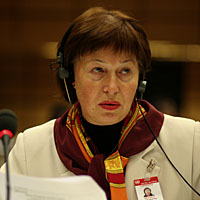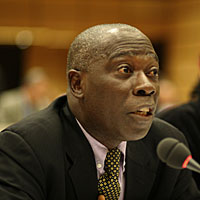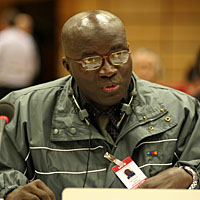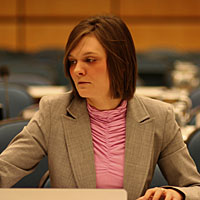|
Wednesday, 21 September
|
|
Reports by the Contact Groups and Drafting Group
|

Jamidu Katima, Tanzania, reported on progress in the contact group on
the global plan of action.
|

Jean-Louis Wallace, Canada, reported on progress in the contact group
on financial considerations.
|

Raphael Azeredo, Brazil, reported on progress made by the drafting group
on the introduction to the overarching policy strategy, and stated that
he would meet with delegations to resolve three remaining areas of
bracketed text.
|
|
Plenary
|

Clifton Curtis, WWF, said language noting the SAICM was voluntary was
not only unnecessary, but insulting and demeaning.
|

On precaution, Glenn Wiser, CIEL, said the concept was expanded in the
Stockholm Convention to cover both environment and health.
|

Speaking for the Africa Group, Oludayo Dada, Nigeria, said that there must
be a clear resolution of financial matters for the effective implementation
of SAICM if negotiations are to continue.
|

Mahmood Khwaja, Sustainable Development Policy Institute, said proposed
language noting that SAICM was voluntary was unacceptable.
|

Zhuo Zhuang, China, said capacity building and technical cooperation
were especially important in the first stage of implementation.
|

Tim M'Mella, Kenya, advised qualifying relevant agencies as "development"
agencies in the governance section of the overarching policy strategy.
|

Speaking for the African Group, Mobolaji Banjo, Nigeria, emphasized
elements included in its informational document on proposed institutional
arrangements for SAICM.
|

Eisaku Toda, Japan, questioned whence the principles of proportionality
and inter-generational equity had been derived.
|

Seham Hussein, Egypt, stressed the importance of finding solutions
to problems which have an effect on developing countries' health.
|

On capacity building, Rajae Chafil, Morocco, asked for a reference to
national scientific research programs.
|

Judy Beaumont, South Africa, listed use of existing structures within the
UN system, financial sustainability, openness, transparency and inclusiveness
as key principles of institutional arrangements.
|

Ibrahim Abderahim, Chad, noted the problem of women's participation in
chemicals-policy making was one of "competence" and suggested deleting
text calling for ensuring their equal participation.
|

Mariann Lloyd-Smith, IPEN, said if the problem is competence, it would
be better to make a reference to that problem rather than to delete
the paragraph.
|

Freddy Sikabongo, Namibia, strongly supported retaining text on ensuring
equal participation of women in chemicals-policy decision making.
|

Eleonore Hauer-Rona, International Council of Women, cited her group's
history of environmental activism, and called for text on ensuring
their equal participation in chemicals-policy decision making to be
kept.
|

Blaise Efendene, Cameroon, suggested clarifying the meaning of the word
"governance" in the overarching policy strategy.
|

Lilian Veas Acuña, Chile, supported deleting a reference to the
need for business frameworks to promote safer products to overcome
technical barriers to trade.
|

Romeo Quijano, IPEN, said meaningful participation entails not only
consultation but participation in formal and informal working groups.
|

Ouro-Djeri Essowê, Togo, suggested adding a reference to harmonization
of chemicals-related national rules and regulations.
|

Laurraine Lotter, ICCA, said there was no need to establish a new body or
forum acting as an oversight body.
|

David Brown, United States, supported using the ICCM as a forum to review
progress, urging the first review to take place 5 years after adoption of
SAICM to allow actors to make progress.
|

Central African Republic supported proposals to highlight the importance
of technology transfer by creating a separate paragraph.
|

Nasser Abdullah Al-Sulaiti, Qatar, noted that developing countries with
high income streams need support to diversify sources of income.
|

Emmanuella Ngenzebuhoro, Burundi, suggested adding references to chemical
wastes.
|

Yang Daravuth, Cambodia, proposed text referring to the facilitation of
"appropriate" use of chemicals.
|

Marie Makelola, Congo, stressed the need to address prevention, and not
only control, of illegal international trafficking of hazardous substances.
|

Rob Visser, IOMC chair, asked for clarification on the changes required
for the IOMC to assume a coordination role for SAICM, and to ensure input
from other organizations.
|

On implementation and taking stock of progress, Fatemeh Falaki, Islamic
Republic of Iran, proposed new text on bridging the gap in capacities
between developed and developing countries.
|

Judy Stober, IFCS, called attention to the informational document it
submitted on key lessons in the chemicals-management international
framework.
|

Miguel Hildmann, Argentina, praised the value and uniqueness of the IFCS
in promoting open exchanges among all participants, and called for
consideration of its future once the SAICM is adopted.
|

Marthe Delphine Rahelimalala, Madagascar, said the high-level declaration
should refer to human health and the environment.
|

Mario Abó Balanza, Cuba, commented on the role of an oversight
body in implementation of SAICM.
|

Marta Ligia Perez, Colombia, suggested noting in the general principles
section that humans are at the center of concerns of sustainable
development, per the Rio Declaration.
|

Valentina Laius, Estonia, suggested text calling for for narrowing the
gap between developed and developing countries.
|

Zadi Dakouri Raphael, Côte D'Ivoire, noted that it might be too
early to agree on a high-level declaration in the absence of agreement
on financial considerations.
|

Momodou Canteh, the Gambia, said that because chemicals could not be made
completely safe, the text should refer to committing to improving,
rather than "achieving," chemical safety.
|
|
Contact Groups
|

The Secretariat said it had compiled six subsets of concrete areas and
activities needing further deliberations, which contain concrete
measures and activities that constitute new proposed activities, and
that might: be inconsistent with existing international policy; be too
prescriptive; fall outside the scope of SAICM; need further drafting for
clarity; constitute new proposed activities; and require or imply
concerted actions. Participants in the contact group addressed the last
subset.
|

The contact group reviewed the text of the chapeau and the first of
seven sub-paragraphs on funding programs. Disagreement arose over
references to "new and additional financial resources," and
"encouraging" or "committing to" global efforts to
advance sound chemicals management. The roles of the GEF, other
multilateral funding mechanisms and bilateral programs were discussed at
length. The text remains heavily bracketed.
|
|
Around PrepCom-3
|

PrepCom-3 President Viveka Bohn (Sweden) reviewed documents in the morning.
|

Delegates also had some morning reading to prepare for discussions.
|

ENB's logistics coordinator Louise Burke (Scotland).
|

